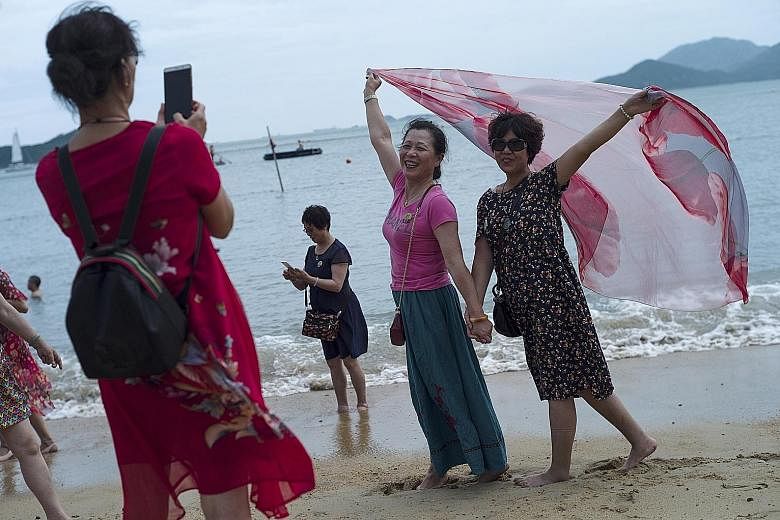On top of being caught in the trade war between the United States and China, Hong Kong now faces headwinds in the form of currency woes that will add to pressure on its tourism and retail sectors.
Despite these concerns, analysts in a straw poll remain optimistic, saying the two factors will have limited impact on the city's economy for this year.
The Hong Kong dollar, which is pegged to the US dollar, has strengthened against major currencies and is hovering at around HK$7.85 per US dollar.
Fears of a prolonged US-China trade war have rattled the yuan, which in recent weeks offset gains in the first half of the year against the US dollar.
Following Wednesday's sharp correction, one US dollar is now trading under 6.80 yuan.
Beijing's move to support China's slowing economy has led to a weaker Chinese currency. This, coupled with a strong Hong Kong dollar, could translate into fewer mainland tourists visiting the territory.
OCBC Wing Hang economist Carie Li told The Straits Times that the city's tourism activities are likely to dip in the second half due to the Hong Kong dollar's rally against major currencies and a possible slowdown in Asia's growth.
The Hong Kong dollar has appreciated by over 8 per cent against the yuan since the end of March, she said, adding that "this might have deterred some mainland visitors, which account for 77 per cent of total visitors (to Hong Kong)".
That said, the strong yuan helped boost tourism and retail sales in the city in the first five months of the year, and JPMorgan's senior economist Carol Liao remains upbeat about the outlook for this year.
"Probably in the third quarter, (yuan) is going to be weak. That'll be a hit on Hong Kong's tourism and retail sectors. But overall... I would think the exchange rate fluctuations of the (yuan) will have limited impact on Hong Kong for the whole year," Ms Liao said.
Hong Kong Tourism Board data shows that from January to May, the number of visitors grew 9.6 per cent from the year-ago period to 25.9 million.
Earlier this month, the government said retail sales for the first five months rose 12.9 per cent from a year earlier in value terms to HK$40.5 billion (S$7 billion), lifted by tourism's strong showing.
Still, the US-China friction has resulted in a volatile Hang Seng Index, which would dampen local spending sentiment, said Mr Frank Lee, a senior investment strategist at DBS Bank.
A silver lining, noted Ms Wendy Liu, head of China equity research at Nomura, is that the cost of conducting business in Hong Kong "certainly improves with the weaker exchange rate", but reduced optimism or increased uncertainty may create a short-term pause or slow-down in economic activities.
Financial Secretary Paul Chan on Tuesday allayed concerns that a weaker yuan will impact Hong Kong, saying the depreciation in the currency "is not that much".
Hong Kong's real gross domestic product grew 4.7 per cent year on year in the first quarter, making it the sixth straight quarter of growth in the past 10 years that is above the 2.7 per cent per annum level.
In the May forecast, the government kept its projection of a 3 per cent to 4 per cent growth for the full year, while analysts' consensus mostly ranged from 2.8 to 3.5 per cent.
Ms Iris Pang, ING Wholesale Banking's greater China economist, is optimistic about the city's economy but believes the government "may need to provide fiscal stimulus to small and medium enterprises to maintain a robust job market", given the spillover effect of the trade war.
Secretary for Commerce and Economic Development Edward Yau this month said the government is prepared to step in with financing schemes to help businesses that suffer as a result of the trade war.


